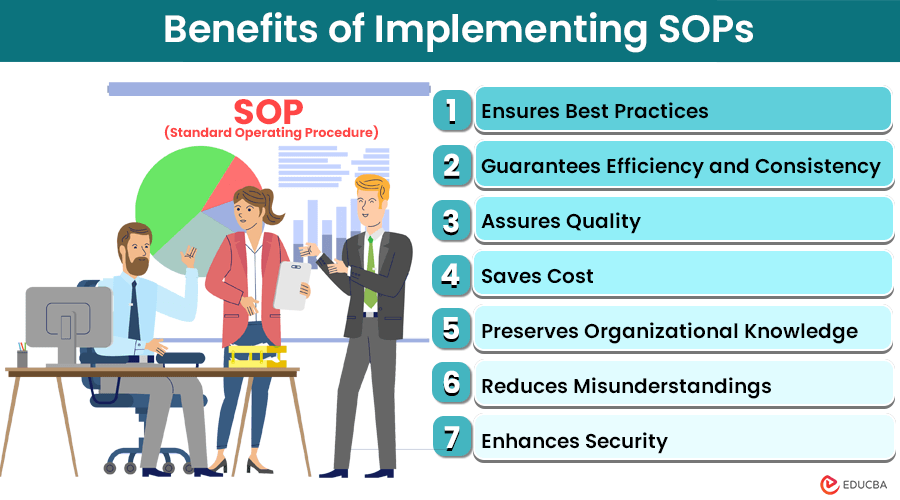
What is the Meaning of SOP in Business?
SOP in business stands for Standard Operating Procedure. The simple answer to what does SOP mean or meaning of SOP is that it is a detailed instruction that guides staff members to perform tasks consistently and effectively.
It gives clear directions and ensures that different team members execute tasks reliably and securely. It establishes an organized task framework by ensuring consistent and successful outcomes regardless of who performs them. SOPs minimize errors and enhance overall performance by ensuring everyone follows the same procedures.
For example, a restaurant uses an SOP to ensure chefs prepare meals consistently, maintaining quality and customer satisfaction. Similarly, manufacturing businesses create SOPs for staff training to mitigate risks and ensure workplace safety. In this article, let us learn more about what is SOP in business.
Key Components of an SOP
Most of the SOPs are composed of a few vital components.
- Title: Clearly identifies the procedure or process described by the SOP.
- Purpose: States the objective or reason for the SOP, outlining what the procedure aims to achieve.
- Definitions: Clarifies any specific terms or acronyms used within the SOP to ensure common understanding.
- Responsibilities: Specifies who is responsible for carrying out each step of the procedure or process.
- Materials and Equipment: Lists the necessary tools, materials, and equipment required to perform the procedure effectively.
- Procedure: Provides a step-by-step description of performing the task or process, ensuring consistency and clarity.
- Documentation: Describe any forms, records, or reports that you must complete as part of the procedure.
- References: Includes relevant documents, standards, or regulations that the SOP complies with or refers to.
- Approval and Revision History: Documents who approved the SOP and when, as well as any revisions made over time to ensure it remains up to date.
What is the Purpose of SOP in Business?
Now, as you are clear with the meaning of SOP, let us see a few of the purposes served by SOP in business:
1. Training and Onboarding
SOPs simplify the training process for new employees by providing clear guidelines and expectations. This ensures new hires quickly grasp their roles and responsibilities, reducing time and resources spent on training while maintaining consistency in job performance.
2. Process Consistency
SOPs provide structured frameworks for performing tasks consistently across manufacturing, customer service, and administrative processes. As they outline exact steps, they minimize variations in output and ensure businesses achieve desired results consistently.
3. Operational Efficiency
SOPs streamline operations by standardizing procedures, eliminating guesswork, and reducing time spent figuring out task execution. This efficiency leads to smoother workflows and optimized resource utilization.
4. Maintaining Schedule Adherence
By outlining clear steps and timelines, SOPs help teams adhere to deadlines and project milestones, ensuring timely project completion and enhancing overall operational efficiency.
5. Risk Management
SOPs play a crucial role in risk management. They include safety protocols, compliance requirements, and contingency plans for handling unexpected situations. Following SOPs helps mitigate risks and ensures a safe working environment.
6. Ensuring Regulatory Compliance
SOPs document procedures that ensure businesses comply with legal requirements in regulated industries like food manufacturing (e.g., FDA guidelines), reducing the risk of fines or penalties.
7. Reducing Product Recall Rates
SOPs with rigorous quality control measures minimize production or service delivery errors, lowering the likelihood of defective products reaching consumers and preserving brand reputation.
8. Continuous Improvement
SOPs are dynamic documents that need regular review and updates, including feedback and improvements. This ongoing process ensures that SOPs remain effective in supporting business goals and adapting to changes in the operating environment.
Benefits of Implementing SOP in Business
Implementing SOP in business offers numerous benefits that contribute to overall efficiency, quality, and safety. Here are some key benefits:
1. Ensures Best Practices
SOPs translate best practices into actionable steps that ensure employees consistently operate in the organization’s best interests. They provide clear directions and guidelines (“true north”) that help teams maximize productivity with minimal resources.
2. Guarantees Efficiency and Consistency
SOPs serve as a roadmap for operational excellence, standardizing procedures across the organization. This uniformity reduces the need for extensive deliberation or corrections, enhancing operational efficiency and consistency.
3. Assures Quality
SOPs elevate the overall quality of work by enforcing consistency and adherence to best practices. Employees can complete tasks swiftly and effectively, maintaining high standards of output.
4. Saves Cost
SOPs contribute to cost savings in various ways. For instance, in manufacturing, they prevent costly downtime by detailing preventive maintenance procedures for machines, thereby avoiding unexpected breakdowns and repair costs.
5. Preserves Organizational Knowledge
Documented SOPs safeguard institutional knowledge within the organization. They ensure continuity despite personnel changes (e.g., retirements, promotions), facilitate smooth transitions and enable new members to access essential operational guidelines.
6. Reduces Misunderstandings
SOPs establish a common understanding of task execution, minimizing confusion and promoting effective communication and collaboration among team members.
7. Enhances Security
SOPs mitigate risks by outlining safe practices and procedures. For example, SOPs for handling hazardous materials detail necessary safety protocols, equipment requirements, and risk assessments, promoting a secure work environment.
Final Thoughts
SOPs are essential business tools that foster efficiency, safety, compliance, and consistency. By designing and maintaining SOPs systematically, businesses can achieve greater performance and productivity standards, reduce risks, and assure regulatory compliance.
Recommended Articles
Explore these recommended articles to learn more about the meaning of SOP in business.
